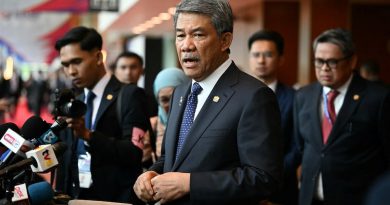Japan, South Korea leaders pray at memorial for Korean atomic bomb victims in Hiroshima
Hiroshima (AP) — Japanese Prime Minister Fumio Kishida and South Korean President Yoon Suk Yeol prayed together Sunday at a memorial for Korean victims of the 1945 atomic bombing in Hiroshima on the sidelines of the Group of Seven summit, as the two leaders continued efforts to mend ties repeatedly hurt by disputes stemming from Japan’s wartime brutality.
Yoon is in Hiroshima with leaders from seven other guest nations and G7 countries for “outreach” sessions on Sunday, the last day of the three-day summit.
Yoon and Kishida, accompanied by their first ladies, stood in front of the memorial where they laid bouquets of white flowers and lowered their heads as they paid tribute to tens of thousands of Koreans who died in the attack 78 years ago.
Yoon is the first South Korean leader to visit the memorial, underscoring the thawing in their rocky relations.
Yoon, at the outset of his talks with Kishida later Sunday morning, praised the Japanese prime minister for his “sincere determination” to improve ties. The meeting is the third between them in two months since Yoon made an ice-breaking visit to Tokyo in March. He said he hoped to deepen cooperation not only between the two sides but also on global issues “based on our deep relationship of trust.”
The leaders’ visit to the Korean memorial was “extremely important for Japan-South Korea relations and for praying for global peace,” Kishida said at the talks.
Kishida was to escort Yoon and other guest nation leaders later Sunday to visit the atomic bomb museum dedicated to the victims and to pray at the main cenotaph at the Peace Memorial Park, a focus of the summit for Kishida as he seeks to emphasize nuclear disarmament and non-proliferation.
Ties have thawed rapidly between the countries since March, when Yoon’s government announced a local fund to compensate some of the former laborers. Tokyo and Seoul, under pressure from Washington, share a sense of urgency to improve ties amid growing security threats in the region.
Kishida and Yoon are to join U.S. President Joe Biden later Sunday for talks about further deepening security cooperation, including ways to strengthen U.S. nuclear deterrence for its two key allies in the region.
Kishida and Yoon met in back-to-back summits in Tokyo and Seoul in recent months aimed at resolving disputes that also included the sexual abuse of “comfort women” in Tokyo’s World War II military-run brothels.
Some 20,000 ethnic Korean residents of Hiroshima are believed to have died in the first nuclear attack. The city, a wartime military hub, had a large number of Korean workers, including those forced to work in mines and factories under Japan’s colonization of the Korean Peninsula from 1910 to 1945.
The first U.S. atomic bombing on Aug. 6, 1945, killed 140,000 people in Hiroshima. A second atomic attack on Nagasaki in southwestern Japan three days later killed another 70,000. Japan surrendered on Aug. 15, ending its nearly half-century attempt to conquer Asia.



